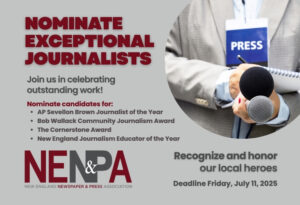 Each year, as part of our New England Newspaper Awards Program, we have the honor of recognizing individual journalists, educators, and vital contributors whose commitment to our industry uplifts us all.
Each year, as part of our New England Newspaper Awards Program, we have the honor of recognizing individual journalists, educators, and vital contributors whose commitment to our industry uplifts us all.
These awards aren’t about accolades for their own sake. They exist to shine a spotlight on people who have, in most cases, dedicated their professional lives to journalism in front of or behind the scenes in a support role, telling the stories that matter, strengthening their communities, supporting investigative work, and passing on their knowledge to the next generation.
Deadline extended for nominations to Friday, July 18, 2025.
This summer, we invite you to nominate outstanding individuals for these four special honors:
AP Sevellon Brown New England Journalist of the Year
This award honors the region’s most accomplished journalist—someone whose exceptional work embodies the best of our profession. It celebrates consistently high-quality reporting, storytelling skills, journalistic ethics, and impact on the public’s right to know.
✅ Nominate a peer or colleague whose work you admire.
✅ Let’s recognize the professionals setting the standard for New England journalism.
✅ Nominations are $60 each.
Learn more & nominate
Bob Wallack Community Journalism Award
Named for a champion of local news, this award honors a journalist who exemplifies dedication to community journalism. It recognizes meaningful, impactful coverage that strengthens civic life and empowers local readers.
✅ Know someone who has gone the extra mile for their town or region?
✅ Help us highlight the essential role of community-focused reporting.
✅ Nominations are $60 each.
Learn more & nominate
The Cornerstone Award
Journalism is a team effort, and some of the most critical contributions happen behind the scenes. The Cornerstone Award honors an individual whose work supports and strengthens a news organization in indispensable ways.
✅ This could be someone whose research powers investigative reporting, who provides outstanding production support, or who consistently helps deliver excellent journalism without always being in the spotlight.
✅ If you know someone who is truly a cornerstone of your newsroom’s success, please consider nominating them.
✅ Nominations are $50 each.
Learn more & nominate
New England Journalism Educator of the Year
Journalism doesn’t thrive without the people who teach it. This award honors an outstanding journalism educator in a university or college classroom. Many of the best journalism teachers in New England are “professors of practice”, experienced journalists who bring real-world wisdom to their students while continuing to work in the field. Others are dedicated instructors shaping the next generation with care and rigor.
✅ We’re asking for your help: If you know someone teaching journalism today whose commitment and mentorship deserve recognition, please nominate them.
✅ Universities and colleges, encourage your faculty to apply or nominate a colleague!
✅ Let’s honor those keeping our profession alive by investing in the future.
✅ Nominations are free.
Learn more & nominate
Why Your Nominations Matter
These awards exist because journalism is, at its heart, a profession of people—storytellers, investigators, educators, and community advocates. By recognizing outstanding individuals, we celebrate not only their achievements but also the values that make journalism essential to a healthy democracy.
We need your help to ensure these awards reflect the true excellence across New England. Take a few minutes today to think about who you’d nominate—and make sure their contributions don’t go unnoticed.

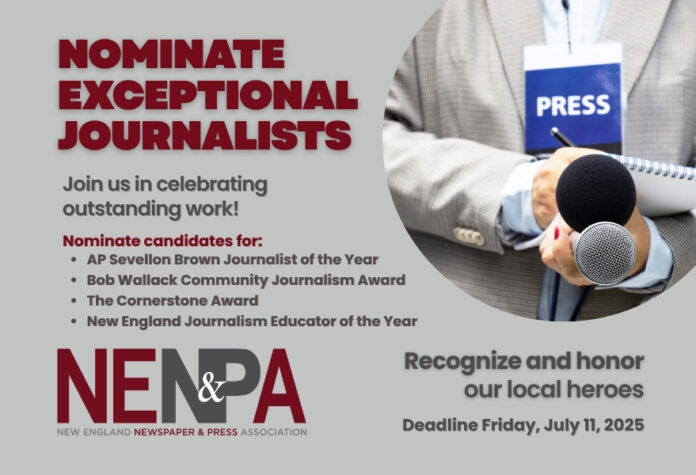



 Each year, the New England Newspaper & Press Association honors the most courageous and consequential reporting in our region through the Publick Occurrences Award. Named after the first newspaper published in America in 1690, this prestigious honor celebrates journalism that exposes injustice, drives reform, and uplifts the role of a free press in civic life.
Each year, the New England Newspaper & Press Association honors the most courageous and consequential reporting in our region through the Publick Occurrences Award. Named after the first newspaper published in America in 1690, this prestigious honor celebrates journalism that exposes injustice, drives reform, and uplifts the role of a free press in civic life.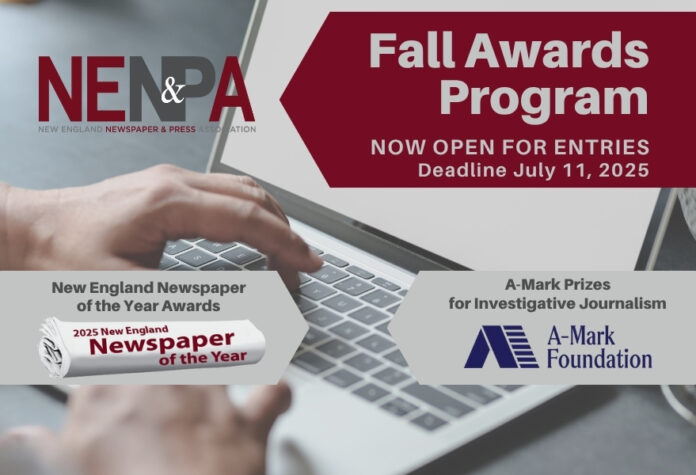
 We are pleased to announce that entries for the NENPA New England Newspaper Awards Program are open now through July 18, 2025. This year, in addition to our long-standing honors recognizing editorial excellence, transparency, and public service, we are introducing an exciting new series of awards—the A-Mark Prizes, which will provide up to $90,000 in monetary awards to journalists and newsrooms.
We are pleased to announce that entries for the NENPA New England Newspaper Awards Program are open now through July 18, 2025. This year, in addition to our long-standing honors recognizing editorial excellence, transparency, and public service, we are introducing an exciting new series of awards—the A-Mark Prizes, which will provide up to $90,000 in monetary awards to journalists and newsrooms.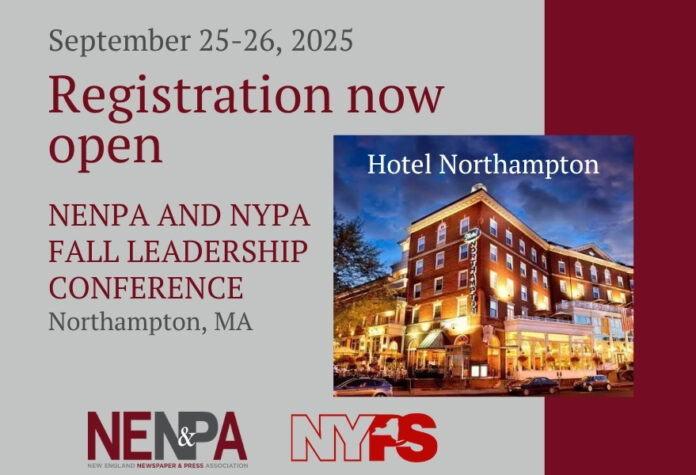
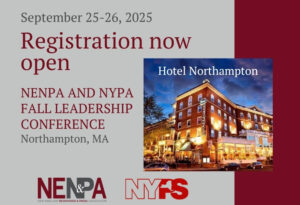 Registration is now open for the NENPA/NYPA Fall Leadership Conference, taking place September 25-26, 2025, at Hotel Northampton in Northampton, Massachusetts.
Registration is now open for the NENPA/NYPA Fall Leadership Conference, taking place September 25-26, 2025, at Hotel Northampton in Northampton, Massachusetts.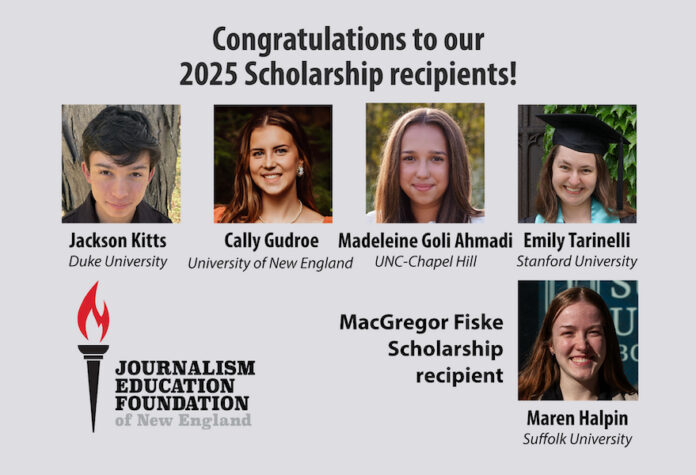
 Madeleine Goli Ahmadi, UNC-Chapel Hill
Madeleine Goli Ahmadi, UNC-Chapel Hill Cally Gudroe, University of New England
Cally Gudroe, University of New England Maren Halpin, Suffolk University
Maren Halpin, Suffolk University Jackson Kitts, Duke University
Jackson Kitts, Duke University Emily Tarinelli, Stanford University
Emily Tarinelli, Stanford University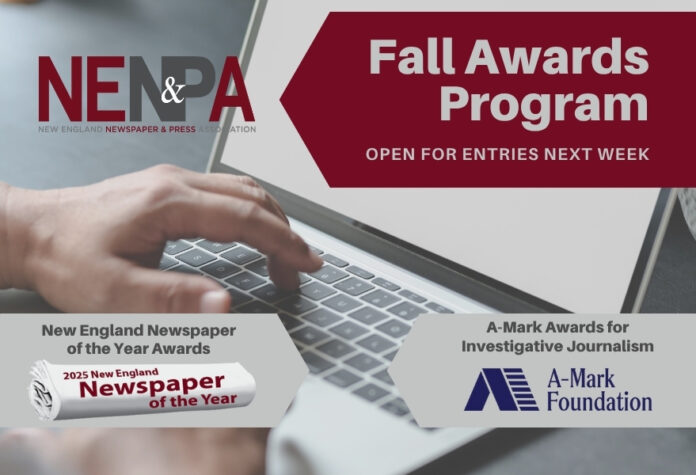
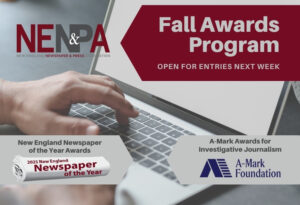 We are pleased to announce that entries for the NENPA New England Newspaper Awards Program will open next week. This year, in addition to our long-standing honors recognizing editorial excellence, transparency, and public service, we are introducing an exciting new series of awards—the NENPA A-Mark Awards for Investigative Journalism, which will provide up to $90,000 in monetary awards to journalists and newsrooms.
We are pleased to announce that entries for the NENPA New England Newspaper Awards Program will open next week. This year, in addition to our long-standing honors recognizing editorial excellence, transparency, and public service, we are introducing an exciting new series of awards—the NENPA A-Mark Awards for Investigative Journalism, which will provide up to $90,000 in monetary awards to journalists and newsrooms.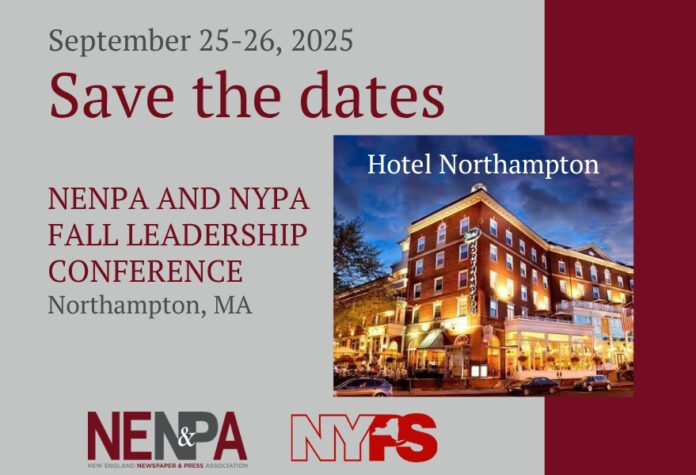
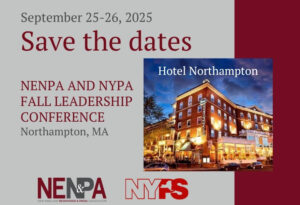 The New England Newspaper and Press Association is once again partnering with the New York Press Association to host a joint leadership conference for senior newspaper executives. This two-day event will take place on Thursday and Friday, September 25-26, 2025, at the historic Hotel Northampton in Northampton, MA.
The New England Newspaper and Press Association is once again partnering with the New York Press Association to host a joint leadership conference for senior newspaper executives. This two-day event will take place on Thursday and Friday, September 25-26, 2025, at the historic Hotel Northampton in Northampton, MA.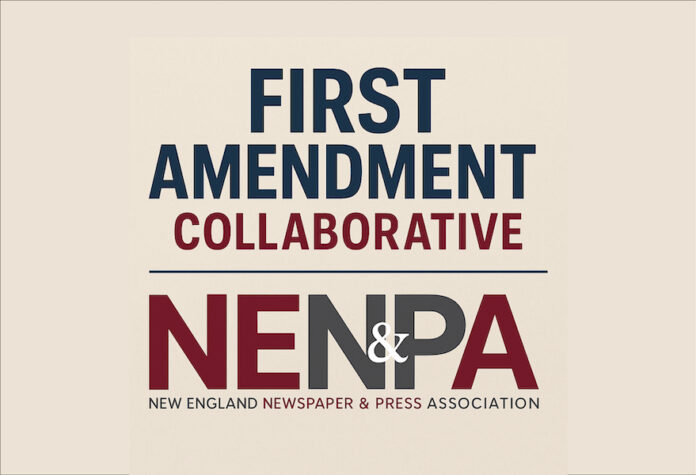
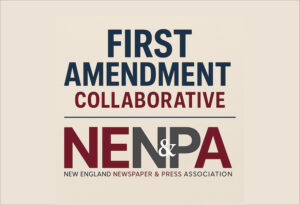 At our recent New England Newspaper Convention, a standing-room-only town hall session made one thing clear: the challenges facing the First Amendment, access to public information, and trust in the media are top of mind for journalists across the region. The energy and urgency in that room inspired the creation of a new initiative designed to keep the conversation going and provide concrete tools for action.
At our recent New England Newspaper Convention, a standing-room-only town hall session made one thing clear: the challenges facing the First Amendment, access to public information, and trust in the media are top of mind for journalists across the region. The energy and urgency in that room inspired the creation of a new initiative designed to keep the conversation going and provide concrete tools for action.
NENPA Joins National Call to Protect Journalists Covering Protests
As protest activity spreads throughout New England and across the country, the New England Newspaper & Press Association (NENPA) has joined with 59 other press freedom and journalism organizations in calling on government leaders to ensure law enforcement personnel are properly trained to respect journalists’ First Amendment rights during mass demonstrations.
The joint letter — organized by the Reporters Committee for Freedom of the Press (RCFP) — was sent to federal, state, and local officials following multiple reports of journalists being injured, detained, or possibly targeted while covering protests in Los Angeles. Such actions, the coalition warns, may violate constitutional protections for newsgathering and free speech.
The letter outlines a series of best-practice protocols for law enforcement agencies to adopt when interacting with journalists at mass demonstrations. These include ensuring officers understand the legal rights of journalists, providing designated law enforcement contacts for press-related issues at protest sites, and preventing unnecessary arrests or interference with reporters performing their jobs. The coalition emphasizes that protecting journalists’ ability to cover these events serves both public safety interests and the public’s fundamental right to access information.
NENPA, which represents more than 450 daily, weekly, and specialty newspapers across Connecticut, Maine, Massachusetts, New Hampshire, Rhode Island, and Vermont, continues to advocate for strong press protections as journalists cover fast-moving developments throughout the region.
Read the full letter from NENPA and the Reporters Committee for Freedom of the Press here.